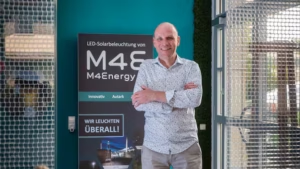Nora Miethke
Arbeitsplätze fallen weg, Werkschließungen drohen. Die deutschen Automobilbauer stehen derzeit unter massivem Druck. Volkswagen mit rund 12.000 Beschäftigten an den drei Standorten in Dresden, Chemnitz und Zwickau hat die seit Jahrzehnten geltende Beschäftigungssicherung gekündigt. Diese Entwicklungen bekommen auch Sachsens Zulieferbetriebe zu spüren. In den ersten sieben Monaten dieses Jahres sei der Umsatz in der Automobilindustrie im Kammerbezirk Chemnitz um 23 Prozent gesunken. „Da muss etwas passieren“, sagt Martin Witschaß, Geschäftsführer Standortpolitik der IHK Chemnitz. In der Region hängt jeder vierte Arbeitsplatz vom Automobilbau ab.
Witschaß wie auch die Netzwerkmanager des sächsischen Autozulieferverbands AMZ haben konkrete Vorstellungen davon, was jetzt notwendig ist. „Das gesamte Automotive-Ecosystem braucht einen Investitionsschub, um Wettbewerbsnachteile zu kompensieren, sonst wandert die Branche schleichend ab“, warnte Andreas Wächtler vom AMZ am Mittwoch in einem Pressegespräch im Vorfeld des jährlichen Kongresses „Automotive Forum Zwickau“ am 5. und 6. November.
Mehr politische Unterstützung für Transformation in der Automobilindustrie
Wie stark genau dieser Schub ausfallen muss, konnte Wächtler nicht beziffern. Aber es müsste in unter anderem in Verfahrenstechnik, Automatisierung und Digitalisierung und Energie investiert werden. Zur Unterstützung der verunsicherten Unternehmen bräuchte es ein Investitionszuschuss-Programm von Bund und Land. In der Automobilregion Südwestsachsen seien mehr als 550 Industrieunternehmen mit rund 62.000 Beschäftigten vom Wandel betroffen. Doch für das Transformationsprojekt ITAS gebe es nur eine Förderung von 8 Millionen Euro, dagegen würden für den Transformationsprozess in den sächsischen Kohleregionen rund zehn Milliarden Euro zur Verfügung stehen, obwohl nur etwa 10.000 Menschen in der Kohleförderung tätig seien. „Da erwarte ich mehr Unterstützung und einen größeren Investitionsschub für die Region“, so Wächtler.
Aber es kommt nicht nur auf zusätzliches Fördergeld an. AMZ-Netzwerkmanager Dirk Vogel verweist auf mehr Tempo bei Genehmigungsprozessen. „Warum kann Sachsen nicht Benchmark für Verwaltungsentscheidungen sein, digitaler, transparenter, schneller?“, regt Vogel an. Das würde allen Unternehmen helfen und zugleich den Aufwand und Personalbedarf in der Verwaltung reduzieren.
Vor allem reine Produktionsstandorte seien wegen zu hoher Energie- und Arbeitskosten gefährdet, abzuwandern. Deshalb fordert Vogel, dass die künftige Landesregierung in den kommenden Jahren vor allem Unternehmen unterstützen sollte, die sich zusammenschließen, wachsen und in Sachsen eigene Headquarter mit Entwicklungsabteilungen aufbauen. „Damit wird das Ecosystem attraktiver für die Forschung“, so der AMZ-Experte.
Strompreis und Maut-Gebühren müssen stimmen
Ein Beispiel ist die WP Holding GmbH mit Sitz in Zwickau. Der Logistikdienstleister beschäftigt rund 1.000 Mitarbeitende, davon 200 in Zwickau. Die Firmengruppe hat sich neue Geschäftsfelder mit Batteriespeichertechnologien und dem Recycling von Lithium-Ionen-Batterien erschlossen. Auch ein Elektro-Lkw wurde schon angeschafft und das Transportunternehmen ist offen für die Umstellung auf weitere E-Fahrzeuge, betonte Geschäftsführerin Doreen Paesold-Runge. Das könne sich auch ohne Förderung bezahlt machen, doch dann müssten die Kosten an andere Stelle stimmen, etwa beim Strompreis oder den Mautgebühren. Den ersten Brennstoffzellen-LKW hat die FES GmbH Fahrzeug-Entwicklung Sachsen nach eigenen Angaben zur Serienreife gebracht – ohne staatliche Förderung. „Unsere Neuentwicklung ist ein wichtiger Schritt in Richtung eines emissionsfreien Güterverkehrs“, sagte Geschäftsführer Christian Schwamberger. Derzeit bereitet die Firma mit 850 Beschäftigten die Fertigung des 18-Tonners vor, 2025 soll es erste Auslieferungen geben.
Industrieregion Chemnitz braucht Anschluss ans Wasserstoff-Verteilnetz
Damit sich Investitionen in solche Fahrzeuge rentieren, müsse die Wasserstoff-Infrastruktur ausgebaut werden, mahnte Martin Witschaß von der IHK Chemnitz. Dazu zähle der Ausbau von überregionalen Wasserstoff-Pipelines mit entsprechenden Ausspeisepunkten in der Region, aber auch ein Netz an Wasserstoff-Tankstellen, um den Umstieg von Diesel-Lkw auf Lkw mit Brennstoffzelle zu ermöglichen.
Dem AMZ ist es ein Anliegen, zu zeigen, dass der Wandel zur Elektromobilität trotz Rückschläge für sächsische Firmen Chancen bedeutet und sich neue Zukunftsperspektiven auftun. Mit diesen Erfahrungen sollte Sachsen in der bundesweiten Debatte stärker sichtbar werden, wünscht sich Christian Sommer, Kommunikationschef von Volkswagen Sachsen.








